Proper moisturisation is key to a good-looking tattoo. Fortunately, nowadays, there’s no shortage of tattoo aftercare products that will help hydrate your skin – and your tattoo. But is coconut oil a good enough alternative? Are tattoos and coconut oil even a thing? That’s what you’re going to find out in this article.
Page Contents
Is it safe to put coconut oil on NEW tattoos?
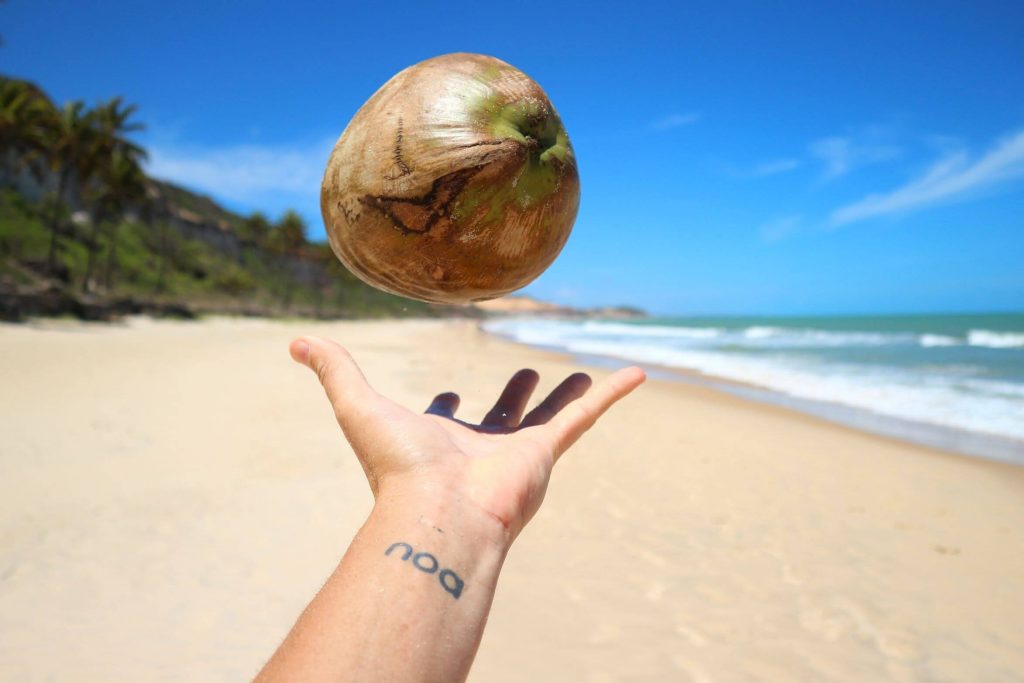
Photo by Chema Photo
If you’re coming straight from the tattooist, and you’re just about ready to do your first wash, then putting coconut oil isn’t such a good idea at this point. This is because your wound, a.k.a. your brand-new tattoo, is still very much open. In fact, it will be bleeding, oozing plasma and lymphatic fluids, and some tattoo ink as well.
Now, coconut oil does have healing properties – it’s an all-in-one antifungal, antibacterial, and antiviral miracle oil, after all. Some people have even gone on record to say coconut oil effectively sped up the healing of their wounds, cuts, and scrapes.
However, some experts say not to use coconut oil on broken skin, only on intact skin. In this case, you may need to wait until your tattoo stops weeping and light scabs start to form before you apply coconut oil to the area.
What to do instead?
During the first couple of days, I recommend you follow tried-and-tested aftercare solutions instead. After washing your tatt with warm water and unscented soap, air dry or pat it dry.
Then apply a thin layer of healing ointment (like Aquaphor). It will act as a protective barrier by preventing bacteria and germs from getting into contact with the tattoo. At the same time, it will allow oxygen in so that the skin layers underneath can heal.
Around day 3, the weeping would have stopped altogether or at least considerably slowed down (this is dependent on how big the tattoo is and how strong your immune system is). At this point, you should be able to start using coconut oil on your tattoo.
But wait… before you do, considering doing a quick patch test to see if you experience any adverse reactions to the oil.
Coconut oil is normally safe for all skin types, but who knows, you could be allergic to it especially if you’ve never tried it before. Better to err on the side of caution than to suffer through an allergy, or even an infection!
Here’s why coconut oil is great for use on new tattoos:
- It’s antimicrobial and antibacterial
Coconut oil contains both caprylic acid and capric acid. These are healthy fats that have antimicrobial and antibacterial properties, so they will protect your new tattoo from harmful pathogens.
- It’s anti-inflammatory
New tattoos are often prone to swelling, but a tiny dab of coconut oil applied regularly may help reduce inflammation.
- It helps regenerate skin cells
Coconut oil works wonders on wrinkles. It’s because it boosts collagen production which smoothens skin out. And with tattoos, you want the skin to stay firm and taut, so your tattoo doesn’t look wrinkled!
- It moisturises the skin
Wanna know the secret to great looking tattoos? Skin hydration and moisturisation! Fortunately for us coconut oil fans, it’s a natural moisturiser. You can apply a few drops throughout the day to help your tattoo heal properly. Once healed, continue using the oil to keep your skin looking nice and healthy!
- Minimises scabs
Scabs are unsightly, I know, but they’re an important part of the tattoo healing process. Once scabs form, do not attempt to pick or pull it off prematurely. Instead, wait for it to fall off naturally. One way to minimise scabs is to apply coconut oil to the healing tattoo. It keeps the skin moist which encourages healing and reduces scab – and scar – formation.
Want more reasons why coconut oil is great for your skin? Read this article.
OLD tattoos and coconut oil – is it safe as well?

Photo by Anastasiia Rozumna
Absolutely! As mentioned earlier, coconut oil is an amazing moisturiser, so there’s really no reason why you can’t use it on old tattoos. Unless, of course, you’re allergic to it. But if you’re not, then by all means, go ahead and use it to moisturise your precious skin art!
Here’s why coconut oil is great for use on old tattoos:
- It’s a natural moisturiser
It’s easy to get lazy and neglect moisturising your tatt once it’s healed. But remember, your tattoo is going to live on your skin forever. If you want it to look good for the foreseeable future, you better make moisturising a regular part of your daily routine!
- It keeps your tattoo looking fresh
It’s unrealistic to expect your tattoo to look as good as it did on day 1. Sooner or later, your tattoo’s going to fade and look old. You can combat that by applying coconut oil daily. For best results, add a tablespoon or two of coconut oil to your diet, so you’re effectively moisturising your skin from the inside out, too!
- Cost-effective alternative to commercial products
Once your tattoo’s fully healed, you can technically use any lotion you like. However, lotions aren’t created equally, and some are more expensive than others. Coconut oil, on the other hand, is extremely affordable and a little goes a long way, so a tiny jar can go a long way!
- Extremely versatile
Unlike other lotions and moisturisers, coconut oil is highly versatile. This means you’re not limited to using it on your tattoo or your skin. In fact, you can very well use it on your hair and your entire body! You can also use it in the kitchen – both for cooking and cleaning. There are so many different uses for coconut oil – you may be surprised!
Check out this infographic on why coconut oil is great for tattoo aftercare:
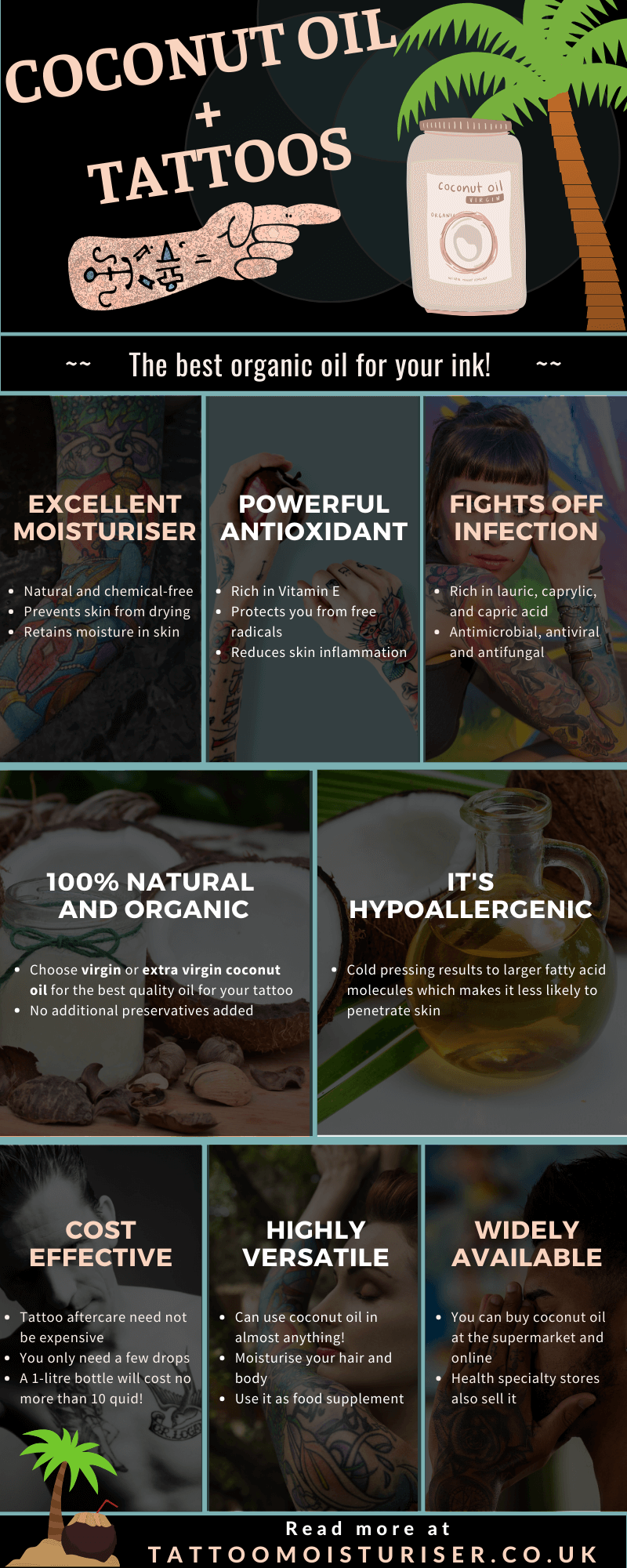
The best coconut oil-based aftercare products
Coconut oil is great on its own, but when it’s mixed with some other ingredients, you can create amazing products with it! When it comes to tattoo aftercare, here are some of our favourite coconut oil-based products:
Sevenhills Cold-Pressed Extra Virgin Coconut Oil
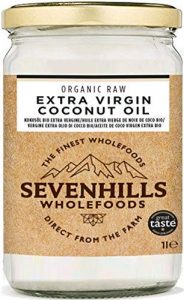
Earlier in this article, I mentioned coconut oil’s versatility. And this product is the perfect example. You can literally use this for cooking, baking, frying, cleaning, hair care, skin care, and more! And a one-litre bottle costs a mere 10 quid – totally affordable!
If you only use this for your tattoo, then a bottle can last you for years – talk about value! Note, however, that pure coconut oil is a well-known comedogenic so it may block your pores, especially if you have oily skin.
Generally, however, coconut oil works well with all skin types. It’s just that some people have oilier skin than others. If you belong to this demographic, then do a patch test first to ensure your tattoo and coconut oil experiment isn’t going to cause a breakout.
Coconut King Tattoo Aftercare Balm
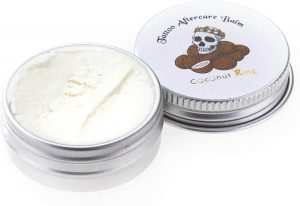
Ingredients: Coconut oil, shea butter, mango butter, cocoa butter
This might be one of the best coconut oil-based aftercare products in the market right now. It’s a blend of 3 different kinds of butters that’s guaranteed to protect and moisturise your skin.
Also, the different butters make for a nice, natural fragrance, so in addition to keeping your tattoo looking great, it will also smell good!
Hustle Butter Deluxe
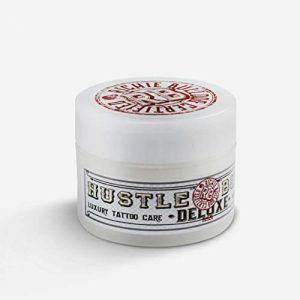
Ingredients: Shea, mango and aloe butters, coconut, sunflower and rice bran oils, rosemary oleoresin, green tea, vitamin e complex & mint arvensis essential oil. With essence of papaya and coconut.
Hustle Butter is touted as an Aquaphor alternative, which means people use it on freshly done tattoos (without waiting for skin to stop weeping). It’s fragrance-free, non-comedogenic and works great for faster healing.
The only downside to Hustle Butter is that it’s the most expensive coconut oil-based product on this list. Some people also say it’s far too greasy, but I personally don’t find it to be excessively so.
Conclusion on tattoos and coconut oil: It’s a YAY!
As you’ve learned in this article, coconut oil is a great tattoo aftercare product. It’s a 100% natural skin moisturiser. It may not be great for extremely oily skin, but the products we’ve mentioned above are specially formulated so that the oil doesn’t clog up skin pores. That said, raw and organic coconut oil works wonders for both new and old tattoos – try it out today!

